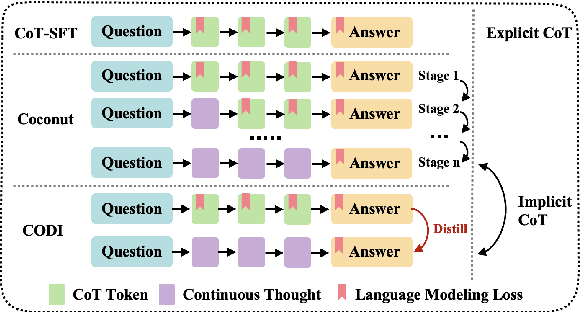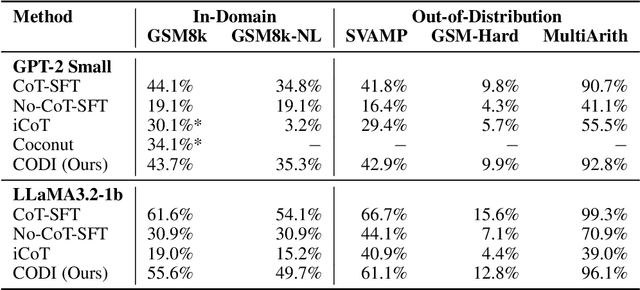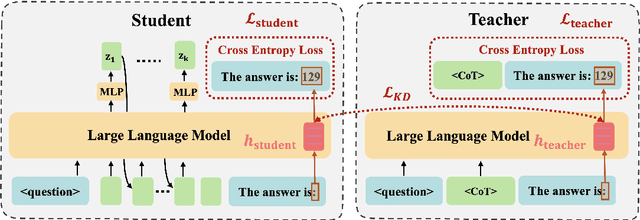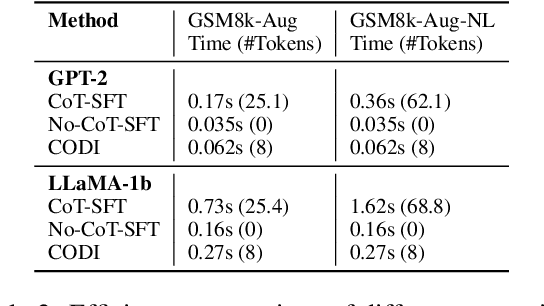Zhenyi Shen
Context Compression via Explicit Information Transmission
Feb 03, 2026Abstract:Long-context inference with Large Language Models (LLMs) is costly due to quadratic attention and growing key-value caches, motivating context compression. In this work, we study soft context compression, where a long context is condensed into a small set of continuous representations. Existing methods typically re-purpose the LLM itself as a trainable compressor, relying on layer-by-layer self-attention to iteratively aggregate information. We argue that this paradigm suffers from two structural limitations: (i) progressive representation overwriting across layers (ii) uncoordinated allocation of compression capacity across tokens. We propose ComprExIT (Context Compression via Explicit Information Transmission), a lightweight framework that formulates soft compression into a new paradigm: explicit information transmission over frozen LLM hidden states. This decouples compression from the model's internal self-attention dynamics. ComprExIT performs (i) depth-wise transmission to selectively transmit multi-layer information into token anchors, mitigating progressive overwriting, and (ii) width-wise transmission to aggregate anchors into a small number of slots via a globally optimized transmission plan, ensuring coordinated allocation of information. Across six question-answering benchmarks, ComprExIT consistently outperforms state-of-the-art context compression methods while introducing only ~1% additional parameters, demonstrating that explicit and coordinated information transmission enables more effective and robust long-context compression.
Youtu-LLM: Unlocking the Native Agentic Potential for Lightweight Large Language Models
Dec 31, 2025Abstract:We introduce Youtu-LLM, a lightweight yet powerful language model that harmonizes high computational efficiency with native agentic intelligence. Unlike typical small models that rely on distillation, Youtu-LLM (1.96B) is pre-trained from scratch to systematically cultivate reasoning and planning capabilities. The key technical advancements are as follows: (1) Compact Architecture with Long-Context Support: Built on a dense Multi-Latent Attention (MLA) architecture with a novel STEM-oriented vocabulary, Youtu-LLM supports a 128k context window. This design enables robust long-context reasoning and state tracking within a minimal memory footprint, making it ideal for long-horizon agent and reasoning tasks. (2) Principled "Commonsense-STEM-Agent" Curriculum: We curated a massive corpus of approximately 11T tokens and implemented a multi-stage training strategy. By progressively shifting the pre-training data distribution from general commonsense to complex STEM and agentic tasks, we ensure the model acquires deep cognitive abilities rather than superficial alignment. (3) Scalable Agentic Mid-training: Specifically for the agentic mid-training, we employ diverse data construction schemes to synthesize rich and varied trajectories across math, coding, and tool-use domains. This high-quality data enables the model to internalize planning and reflection behaviors effectively. Extensive evaluations show that Youtu-LLM sets a new state-of-the-art for sub-2B LLMs. On general benchmarks, it achieves competitive performance against larger models, while on agent-specific tasks, it significantly surpasses existing SOTA baselines, demonstrating that lightweight models can possess strong intrinsic agentic capabilities.
Beyond Prompting: An Efficient Embedding Framework for Open-Domain Question Answering
Mar 03, 2025



Abstract:Large language models have recently pushed open domain question answering (ODQA) to new frontiers. However, prevailing retriever-reader pipelines often depend on multiple rounds of prompt level instructions, leading to high computational overhead, instability, and suboptimal retrieval coverage. In this paper, we propose EmbQA, an embedding-level framework that alleviates these shortcomings by enhancing both the retriever and the reader. Specifically, we refine query representations via lightweight linear layers under an unsupervised contrastive learning objective, thereby reordering retrieved passages to highlight those most likely to contain correct answers. Additionally, we introduce an exploratory embedding that broadens the model's latent semantic space to diversify candidate generation and employs an entropy-based selection mechanism to choose the most confident answer automatically. Extensive experiments across three open-source LLMs, three retrieval methods, and four ODQA benchmarks demonstrate that EmbQA substantially outperforms recent baselines in both accuracy and efficiency.
CODI: Compressing Chain-of-Thought into Continuous Space via Self-Distillation
Feb 28, 2025



Abstract:Chain-of-Thought (CoT) enhances Large Language Models (LLMs) by enabling step-by-step reasoning in natural language. However, the language space may be suboptimal for reasoning. While implicit CoT methods attempt to enable reasoning without explicit CoT tokens, they have consistently lagged behind explicit CoT method in task performance. We propose CODI (Continuous Chain-of-Thought via Self-Distillation), a novel framework that distills CoT into a continuous space, where a shared model acts as both teacher and student, jointly learning explicit and implicit CoT while aligning their hidden activation on the token generating the final answer. CODI is the first implicit CoT method to match explicit CoT's performance on GSM8k while achieving 3.1x compression, surpassing the previous state-of-the-art by 28.2% in accuracy. Furthermore, CODI demonstrates scalability, robustness, and generalizability to more complex CoT datasets. Additionally, CODI retains interpretability by decoding its continuous thoughts, making its reasoning process transparent. Our findings establish implicit CoT as not only a more efficient but a powerful alternative to explicit CoT.
 Add to Chrome
Add to Chrome Add to Firefox
Add to Firefox Add to Edge
Add to Edge